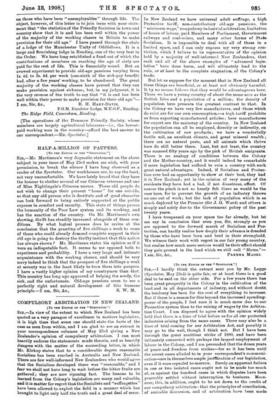SIR,—In view of the extent to which New Zealand has
been quoted as a very paragon of excellence in matters legislative, it is high time that some one should state the facts of the case as seen from within, and I am glad to see an extract in your correspondence columns of May 23rd giving a New Zealander's opinion of compulsory arbitration. I can most heartily endorse the statements made therein, and as heartily disagree with the matter of the succeeding letter, in which Mr. Kirkup states that to a considerable degree reasonable Socialism has been reached in Australia and New Zealand. There are few well-informed New Zealanders who would agree that the Socialism developed there was "reasonable," and I fear we shall not have long to wait before the bitter fruits are gathered ; they are now ripening fast. The lessons to be learned from the Colony's legislation are many and valuable, end it is matter for regret that the Socialists and "suffragettes" have been allowed to exploit the field in a manner which has brought to light only half the truth and a great deal of error. In New Zealand we have universal adult suffrage, a high Protective tariff, non-contributory old-age pensions, the " minimum wage," compulsory industrial arbitration, limitation of hours of labour, paid Members of Parliament, Government railways and coal-mines, and many other forms of State Socialism. It is impossible to deal with all of these in a limited apace, and I can only express my very strong con- viction, which I believe to be representative of the opinion held by a majority of well-informed New Zealanders, that each and all of the above examples of " advanced legis- lation " have done harm, and will ultimately lead to the ruin, or at least to the complete stagnation, of the Colony's trade.
But let us suppose for the moment that in New Zealand all these things are beneficial, or at least not obviously harmful. It by no means follows that they would be advantageous here. There we have a young country of about the same area as the British Isles and a population of a million; the density of population here presents the greatest contrast to that. Ih the Colony we have very few manufactures, and those which do exist are for our own consumption,—a high tariff prohibits us from exporting manufactured articles ; here manuftiotures for export are the mainstay of the country. In New Zealand the population can all be employed, directly or indirectly, on the cultivation of raw products ; we have a wonderfully fertile soil, an excellent climate, and great mineral wealth ; there are no natural pests, and all animals which thrive here do still better there. Last, but not least, the country was manned fifty years ago by the pick of British emigrants. There is no analogy of conditions between the Colony and the Mother-country, and it would indeed be remarkable if mere legislation had sufficed to ruin a country with such great natural advantages. Indeed, if Socialism and Protec- tion ever had an opportunity to show at their best, they had it in New Zealand; yet in the opinion of very many of the residents they have had a bad, if not disastrous, effect. Of course the pinch is not so keenly felt there as would be the case here, for to prevent the growth of an industry throws no one out of work ; but the lack of population which is so much deplored by the Premier (Sir J. G. Ward) and other* is simply and solely due to the Government policy of the put twenty years.
I have trespassed on your space too far already, but let me say in conclusion that even you, Sir, strongly as yott are opposed to the forward march of Socialism and Pro- tection, can hardly realise how deeply their advance is dreaded by those who have been horn and bred in their stronghold. We witness their work with regret in our fair young country, but realise how much more serious would be their effect should they gain ground in the land which we still call " Home."—






































 Previous page
Previous page